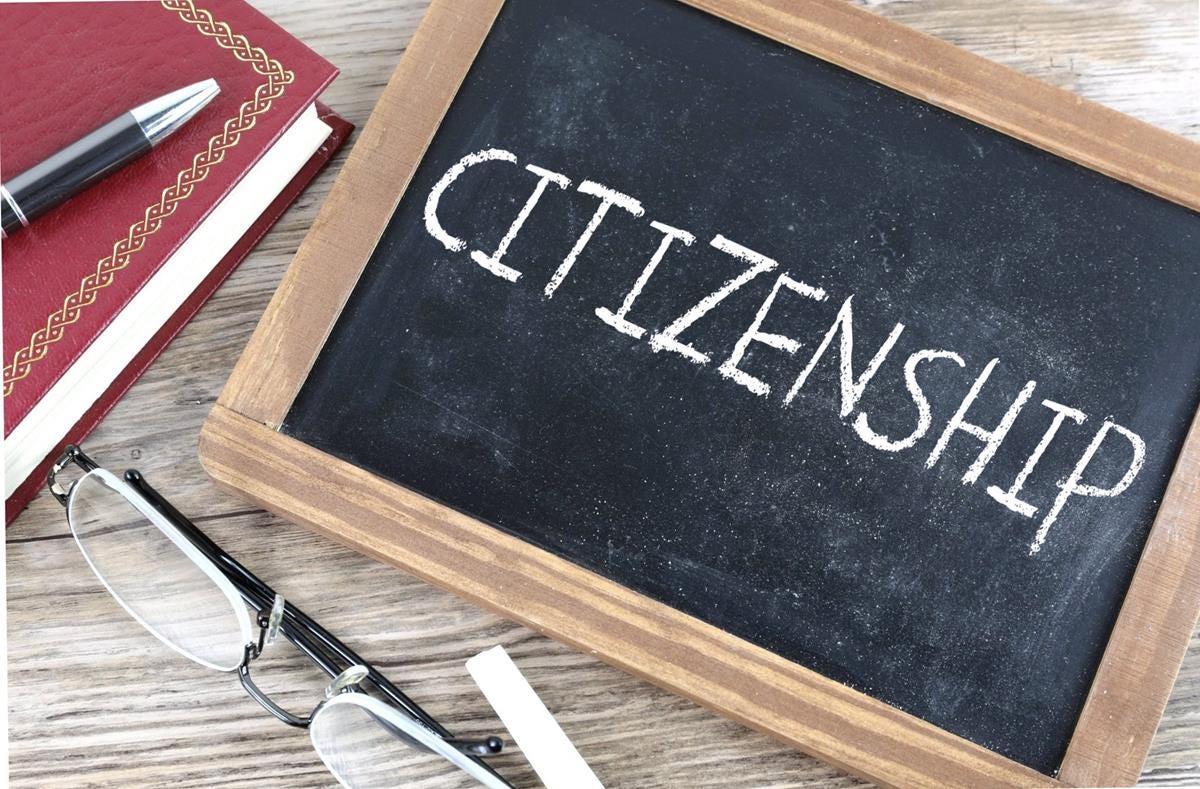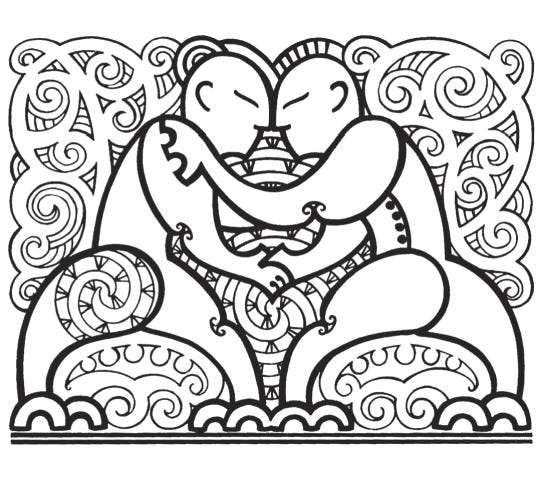I explore why one's ancestry and heritage are not the same as citizenship. I also ask, do we need the Waitangi Tribunal anymore?
The Waitangi Tribunal recently has ruled that the government should change the law for New Zealand citizenship, notably that citizenship by decent rules should be broadened. Importantly and controversially, the Tribunal ruled that this broadening of rules should apply to Māori only.
This whole situation got me thinking on two points. The first is whether having Māori whakapapa (genealogy) and citizenship are necessarily the same thing. The second is around whether New Zealand needs the Waitangi Tribunal.

The brief context to all of this are two sets of people with Māori ancestry and whose children are not New Zealand citizens. In both cases, these people – including actress Keisha Castle Hughes – were born overseas to New Zealand parents and they themselves were granted citizenship. That is, their parent(s) were New Zealand citizens and so descent was able to be passed down one generation, as per the Citizenship Act 1977. What Keisha and a gentleman called John want is to be able to pass their citizenship by descent onto their children also born outside New Zealand. This is outside the current rules and generally not practiced by overseas jurisdictions either.
We can debate the merits or otherwise of expanding the descent rules to a second generation who were born outside of New Zealand, but the kicker was that the Waitangi Tribunal called for any expansion to only apply to those with Māori ancestry or whakapapa.
Most commentators have challenged this based on an equal rights argument, that if there were to be a change on descent rules then it should apply to everyone.
My own reflection was that there appears to be confusion (deliberate or otherwise) around whakapapa and citizenship. The two are not the same. One can have Māori heritage and not be a citizen, or be a citizen and not Māori. You can of course be Māori and a citizen as well. Not being a citizen of New Zealand does not take away, in any shape or form, one’s ancestry, whatever that is.
Put another way, Keisha and John’s respective families are no less Māori due to their citizenship status. One’s heritage is a moral fact or reality, whereas citizenship is a legal right. The two do not need to be confused. They can still whakapapa Māori, they can still celebrate their heritage and ancestors, they can visit and explore this country. Citizenship instead is imparted by the Crown to all who reside here or have, as the law currently stands, a one generational connection.
Not everyone is equally Māori, but everyone is equally a citizen.
The Waitangi Tribunal appears to overlook this and instead came up with a rather conflated and unworkable solution – to broaden the descent rules for one group of citizens only. Why the Tribunal stopped at only second generational descent is not obvious either for, if they believe whakapapa to be a key determinant, then no generational limits should apply.

The logo of the Waitangi Tribunal
Finally, the decision of the Waitangi Tribunal as well of others of late, does raise the question of whether we need the Tribunal at all. For me the Tribunal is irrelevant by the mere fact that the Tribunal only ever rules in one direction. We all knew the outcome of this case even before it was heard and in the same way New Zealanders can anticipate the results of 99.9% of any of the cases heard. Why the taxpayer expends tens of millions on the process is unclear, other than providing theatrical legitimacy. Surely it would be cheaper (including for claimants) and more efficient to just have lodged claims accepted and presented to government without the Tribunal acting as an expensive intermediary.
Simon O'Connor a former National MP graduated from the University of Auckland with a Bachelor of Arts in Geography and Political Studies . Simon blogs at On Point - where this article was sourced.

The brief context to all of this are two sets of people with Māori ancestry and whose children are not New Zealand citizens. In both cases, these people – including actress Keisha Castle Hughes – were born overseas to New Zealand parents and they themselves were granted citizenship. That is, their parent(s) were New Zealand citizens and so descent was able to be passed down one generation, as per the Citizenship Act 1977. What Keisha and a gentleman called John want is to be able to pass their citizenship by descent onto their children also born outside New Zealand. This is outside the current rules and generally not practiced by overseas jurisdictions either.
We can debate the merits or otherwise of expanding the descent rules to a second generation who were born outside of New Zealand, but the kicker was that the Waitangi Tribunal called for any expansion to only apply to those with Māori ancestry or whakapapa.
Most commentators have challenged this based on an equal rights argument, that if there were to be a change on descent rules then it should apply to everyone.
My own reflection was that there appears to be confusion (deliberate or otherwise) around whakapapa and citizenship. The two are not the same. One can have Māori heritage and not be a citizen, or be a citizen and not Māori. You can of course be Māori and a citizen as well. Not being a citizen of New Zealand does not take away, in any shape or form, one’s ancestry, whatever that is.
Put another way, Keisha and John’s respective families are no less Māori due to their citizenship status. One’s heritage is a moral fact or reality, whereas citizenship is a legal right. The two do not need to be confused. They can still whakapapa Māori, they can still celebrate their heritage and ancestors, they can visit and explore this country. Citizenship instead is imparted by the Crown to all who reside here or have, as the law currently stands, a one generational connection.
Not everyone is equally Māori, but everyone is equally a citizen.
The Waitangi Tribunal appears to overlook this and instead came up with a rather conflated and unworkable solution – to broaden the descent rules for one group of citizens only. Why the Tribunal stopped at only second generational descent is not obvious either for, if they believe whakapapa to be a key determinant, then no generational limits should apply.

The logo of the Waitangi Tribunal
Finally, the decision of the Waitangi Tribunal as well of others of late, does raise the question of whether we need the Tribunal at all. For me the Tribunal is irrelevant by the mere fact that the Tribunal only ever rules in one direction. We all knew the outcome of this case even before it was heard and in the same way New Zealanders can anticipate the results of 99.9% of any of the cases heard. Why the taxpayer expends tens of millions on the process is unclear, other than providing theatrical legitimacy. Surely it would be cheaper (including for claimants) and more efficient to just have lodged claims accepted and presented to government without the Tribunal acting as an expensive intermediary.
Simon O'Connor a former National MP graduated from the University of Auckland with a Bachelor of Arts in Geography and Political Studies . Simon blogs at On Point - where this article was sourced.


8 comments:
As I understand it, the taxpayer pays for claimants to research their claims to the Tribunal, so it costs them nothing. The Tribunal should go, and so long as the door is left open, Māori will continue with their dubious claims, costing the country billions.
Yes get rid of the Waitangi Tribal Union.
The Waitangi Tribunal should be abolished as it discriminates and is divisive whereas it was previously a guardian or spokeperson for the downtrodden and inarticulate first immigrants .
A Waitangi Tribunall opinion is NOT lawful or enforceable but a mouthpiece now for radicals to chant and stomp their feet hoping someone will forward more money or whatever they choose.
I suspect in the case of demanding compulsory payment for their hurt feelings at the Macraes Gold Mine the payment demanded will be by the ounce , because greed has no bounds .
"Surely it would be cheaper (including for claimants) and more efficient to just have lodged claims accepted and presented to government without the Tribunal acting as an expensive intermediary." How about this for a solution that would be even cheaper - bin the 1975 Act and just reject all lodged claims?
But if you do away with the Tribunal, a very significant chunk of the 'Maori economy' will go with it. And, by comparison, that recent "unprecedented attack on Maori" (being those amendments to MACA) will pale into insignificance.
Just like everyone else, grifters need an income and, with this one paying so regularly & handsomely, you best prepare for that hikoi from Hell.
Re: Hikoi, I learnt two salient lessons from my time in the armed forces:
1. Get your retaliation in first
2. If someone comes at you with a big stick, make sure you have a bigger one.
NB. This is not advocating violence in any way, it is simply saying do not lay down and take it, those of us fed up with co-governance and maorification need to mobilise against it.
History has proven so many times that all appeasement to bullies does is just delay the inevitable showdown, and just like the proverbial snowball, the showdown gets bigger the longer you leave it. NZ is fast approaching that showdown and it will be ugly
The Waitangi Tribunal was established in 1975 to address breaches of the Treaty of Waitangi by the Crown. Initially, it could only consider claims after 1975, but its jurisdiction was expanded in 1985 to include historical claims back to 1840. And therein lies a constitutional and political conundrum that will continue to vex societal cohesion in NZ. The "us and them" factor, widening the gulf that has already corralled NZers into polarising camps.
Applying contemporary jurisdiction to the decisions and mistakes of the past cannot achieve the progressive solutions that build for a better society. The "grievance industry" has become something of a "gravy train" on a one way trip to nowhere. Tribal compensation for perceived past wrongs will never be enough. The next generation will simply say "I saw no money or advantage. I want my land back". The beat goes on. The Waitangi Tribunal makes decisions that are not binding, so what's the point? Is it a talk-fest to undermine any resolutions of government that Maori may disagree with? Or can it achieve what the TPM MPs have so far failed to achieve, like some pro-active policies that will galvanise the way to success? Time will tell.
Post a Comment
Thank you for joining the discussion. Breaking Views welcomes respectful contributions that enrich the debate. Please ensure your comments are not defamatory, derogatory or disruptive. We appreciate your cooperation.